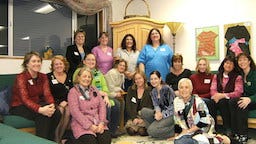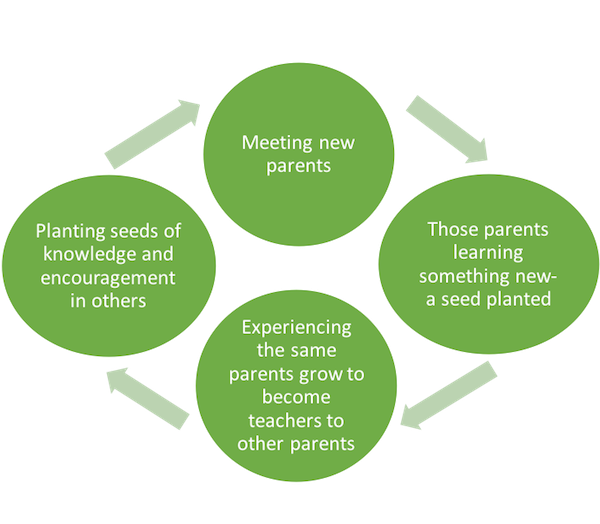Parent-to Parent Networking: An Invaluable Strength
- Sep 7, 2018
- 0 Comments
 By Robin Ryan, founder and facilitator of Our Time Out
By Robin Ryan, founder and facilitator of Our Time OutPiles of books and articles, hours of online videos, top ten lists of do’s and don’ts, and integrating discussions with educational/health service providers can be some of the most helpful building blocks to expanding one’s knowledge when you are a parent of a child with a disability. However, a cornerstone or keystone, is the invaluable strength of parent-to-parent networking. The opportunity to connect with others going through a similar experience can often help with gaining and sharing resources, navigating challenges, and providing unique emotional support.
“I’ve laid my child in a surgeon’s arms, I have slept upright in a hospital chair, I have listened to the beeping of machines and been thankful, I have smiled though the tears, I have found strength when there wasn’t any left. A Mother’s love is the fuel that enables a normal human being to do the impossible.” - Unknown Author
[caption id="attachment_2657" align="alignleft" width="350"]
 Our Time Out Winter Celebration, 2005, Sacramento, CA[/caption]
Our Time Out Winter Celebration, 2005, Sacramento, CA[/caption]Here’s the story of Our Time Out, a mom’s group in Sacramento, California.
In the Spring of 1999, the Our Time Out mother’s group was formed in Sacramento, California. This group started under the wing of the local Family Resource Center and moved into a grass- roots independent group. Word spread about the group through newsletters, flyers posted at doctors’ offices and school bulletin boards, and interested moms sharing with others. Our Time Out caught the interest of mothers, grandmothers, and sisters who share the very special bond of raising a child with a disability. The focus of the group was to take time out of our busy schedules to connect, share thoughts, and ideas with other mothers and caregivers in a positive, supportive environment.
Prior to Our Time Out, there were (and continue to be) wonderful community support groups available for parents of children with specific types of diagnosis or disabilities. Groups were available for parents of children diagnosed with Autism, Cerebral Palsy, Down Syndrome, Visual or Hearing Impairments, as well as some unique and rare diagnosis. Invaluable information is gained through these groups in the community. Many parents were eager to continue their learning and cast their nets even further. Parents in the community whose children had a diagnosis, and those who did not, expressed a desire to connect with others who had children with disabilities of varying ages.
Our Time Out started meeting the 3rd Thursday of the month at 7pm at a local restaurant. After a while the group had well over 100 members in the contact roster, with approximately 10-20 attending the monthly meeting. Some moms participated one time, others sporadically, while others attended every month. Although they could not always attend, moms felt supported knowing that there was a group they could reach out to when needed. As the group grew, we mapped the locations attendees were coming from. Some were driving up to an hour just to join us! It was then that a second group was formed to support parents more geographically closer to their homes. The second group met the 2nd Wednesday of the month. Two groups were in full swing for several years, some moms attended both, or whichever night worked better for them. Eventually, the restaurant where the original group was held went out of business. Most moms lived near the second group location, so Our Time Out went back to being one location, one night a month.
Over time, participation has decreased for several reasons. Moms have found and built up their support structure and do not have an interest or need to attend a group. Several Moms have continued to set aside the day and time and use it for a night out with friends, shopping, or movies. There have been children that have passed away and their moms no longer choose to attend. In addition, since Our Time Out is a long-standing group, advertising decreased to mainly Facebook. Therefore, some parents who seek this type of connection may not be aware of the meeting details. A small group still meets every month, sharing their joys and triumphs and welcoming in any new or returning moms that choose to participate.
As a facilitator of the group, volunteering for almost two decades, the most amazing and gratifying thing to witness while experiencing the ebb and flow of a parent group, is how dynamic the power of this parent-to-parent networking cycle can be.
[caption id="attachment_2659" align="aligncenter" width="600"]
 Parent-to-Parent Networking Cycle by R. Ryan[/caption]
Parent-to-Parent Networking Cycle by R. Ryan[/caption]Our Time Out parent-to-parent networking has helped to form many close friendships. Parents have shared stories of vacationing together with other families who understand the necessary additional considerations to have a memorable, enjoyable time. They’ve advised each other on working through numerous educational and medical topics and supported each other while they or their child is in the hospital. In the heartbreaking times, they’ve wrapped around to comfort a fellow mom and family grieving the death of their child.
“When I leave the mom’s group meetings, I leave smiling, knowing I did something positive for myself, knowing that there is a group of women, who just simply understand” - Our Time Out Mom
Ingredients and simple structure of the Our Time Out group:
There are many ways to form a group in one’s community with little to no monetary cost. Here is our structure and some additional considerations when forming a parent group like this one.
- One or two consistent facilitators or point persons who are a parent of a child with a disability.
Why? A familiar face for a networking group is invaluable for forming relationships and expectations. Being a parent of a child with a disability, while working, and supporting other parents to network is a big undertaking. Before taking this on, one must ask themselves honestly - am I able to commit to this for a year, or a few years? Do I need a trusty side-kick? Is it a good fit? Talk with those who currently facilitate groups in your area to gain more perspective.
What does a facilitator do? The minimum role is to ensure reservations and ongoing communication with the restaurant manager, keep a roster of members, communicate details or cancellations, facilitate welcomes, move the conversation along, and interact with all participants. Having group and conversational skills is helpful. The maximum role includes organizing group events outside of the monthly meeting and/or providing resources to share. The sky is the limit!
- Pick a standing time and day of the week
Why? This consistency is a gift to others. It’s easier to calendar in for the entire year when it is based on a re-occurring day of the week within a month. Parents we surveyed preferred Tuesday, Wednesday, Thursday. (e.g. 2ndWednesday of the month)
- Location is key
Choose a local restaurant that will: A) take a reservation, B) allow the group to have the quietest group table or area, C) allow separate checks, D) agree to not charge the 18% group gratuity, E) offer a varied menu.
Having a meeting in-person with the manager during their non-peak hours is a great way to forge a relationship and see if they can accommodate the needs of the group.
Why a restaurant vs. someone’s home, office, or church meeting space? Although these are all great spaces to meet, we chose the approach of using restaurants in the community that would offer a neutral, comfortable low risk for parents who are interested but are still not sure about participating. We have had moms sit at a table nearby to check it out before joining us at the table. Some parents choose to eat dinner while others just have a coffee. Another benefit is that there is no major set-up or clean-up for the facilitator or participants.
- Structure: The meeting itself is free flowing in nature.
The facilitator may bring the group to order and share an announcement or resource. The participants are invited to introduce themselves and share a tiny bit about their child/something new or an update, and most importantly we have upheld the tradition the moms share one positive thing they did for themselves over the last month.
This can be tough for some because many caregivers forget to take time out for themselves. Sharing this can be a step toward encouraging intentional moments of self-care, even just 10 minutes a day of listening to favorite music is a great example.
After each person has shared, the group naturally branches off to networking either as a larger group or pairs. Most of the time, this is based off of what people shared in their introduction. It is helpful to have a few topics ready to discuss, just in case people are not naturally talkative.
A few additional learned tips:
Get the word out, have a clear focus, revisit location and structure, evaluate your efforts!
Respect the Speaker: The group will naturally keep one another on task when they are a part of the process. To have the best chance of making it all the way around your table during the introductions portion, it is helpful to have a timer, limit side conversations, and use a talking stick or something similarly symbolic that the person sharing can hold to indicate who has the floor.
Maintain a Contact Roster: A simple contact sheet can be helpful for connecting parents as needed and updates on meeting details. Be upfront on the purpose of the contact roster, decide if it will be for internal connections and updates, sharable, or both. Some parents may be fine with being on a group list to enhance their network. While others do not want the additional mail and interactions that can come from being on such a specific type of contact list.
Presentations: A rule of thumb is to stay away from singular product/program presentations during the monthly meetings. Often service providers or parents would ask if they could take an hour or more to share or present. Feedback we have received over time suggested that parents attending were interesting in parent to parent networking as the focus, not being a captive audience to an infomercial. Bringing a brochure about a product or organization and sharing briefly has been well received though.
For more information about groups and resources for families and students with disabilities in your state a good starting place is the Parent Training and Information Center (PTI).
